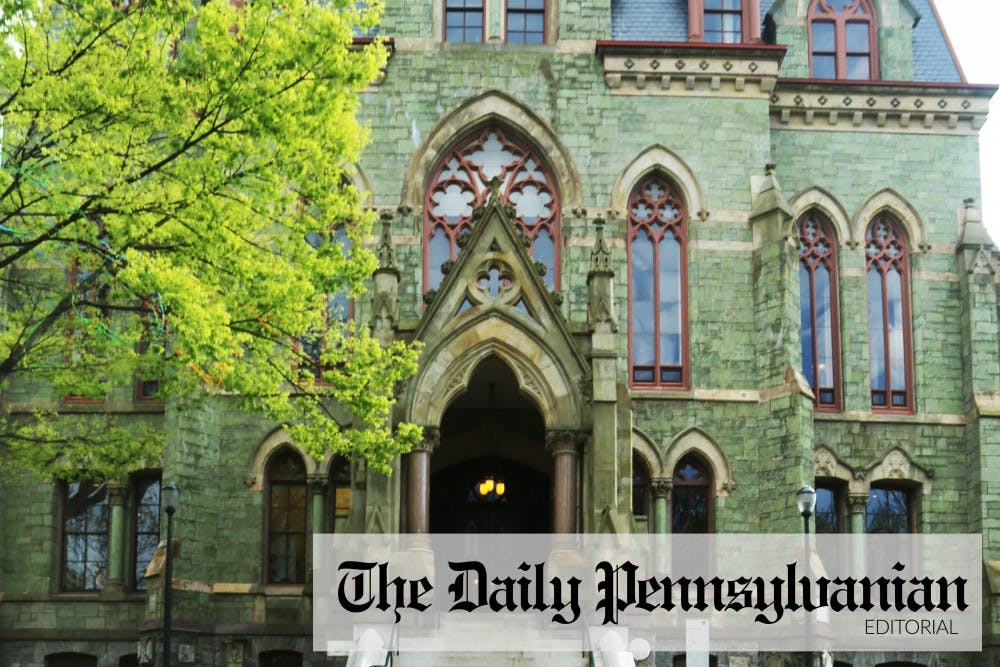
The day before classes started, Provost Vincent Price sent an email to all undergraduates about the recently launched “Campaign for Community.” An ambitious project, its goal is to help the Penn community “discuss and confront issues that are often avoided because they may seem ‘controversial’ or intractable.” To that effect, Price also encouraged faculty and staff to consider serving as Open Expression Monitors — observers sent to potentially fraught events or programs to ensure that the rights of the “meeting or demonstration participants to express their opinions in non-disruptive ways” are upheld.
At a time when universities are increasingly under fire for disregarding and oppressing open expression, we’re glad to see Penn maintaining its firm commitment to freedom of thought, freedom of inquiry and freedom of speech — in the form of a University-wide campaign, no less. Penn clearly wants to encourage discussion about fraught topics, many of which impact us as college students — affirmative action, trigger warnings and college sexual assault policies, to name a few — and we believe that productive discussions can lead to valuable and necessary change in these areas.
At colleges across the country, there have been countless incidents where students and speakers have faced opposition from their peers and administrators for their controversial stances on hot-button issues. These incidents would likely have benefitted from Open Expression Monitors of some sort to encourage communication and respectful debate instead of the selective filtering that often occurred instead. When a student organization at Brown University invited controversial individualist feminist Wendy McElroy — who is widely known for denying the existence of “rape culture” in America — to a debate about rape culture, Brown President Christina Paxson announced the creation of a University-sanctioned, alternate event to take place at the same time, effectively discouraging students from attending the other event.
Given Penn’s push for more open, controversial discussions, Open Expression Monitors should encourage students to host events even if they’re controversial, and likewise encourage them not to cancel an event because they received negative feedback. The University of Michigan’s suspension of a columnist for writing a “hostile” column making fun of the concepts of privilege and microaggressions, for example, was clearly in and of itself “hostile” to the principle of open expression. And to suggest that Penn organizations are immune to such a mentality would be absurd considering that just two years ago, the Wharton India Economic Forum disinvited India’s Prime Minister Narendra Modi — who at the time was chief of an Indian province — after significant backlash from students and faculty about Modi’s political track record.
In these cases, it would be an egregious overstepping of boundaries for the Open Expression Monitors to prevent student groups from taking the actions that they feel are necessary. But we hope if similar cases arise in the future at Penn, the administration will encourage groups to stand up to the backlash and assert their right to host speakers and events that may seem unpalatable, controversial or “wrong.”
There also may be situations in which the University’s responsibility is to restrict the actions of the protesters. In cases like the net neutrality protest at the Board of Trustees meeting last semester, for example, Penn should support the rights of the protesters to assemble and voice their dissent, but only outside of the meeting in question. Balancing the rights of the protesters with the rights of the protested moving forward will be the most important — and most complicated! — role of Penn’s Open Expression Monitors.
Penn has come a long way since the notorious water buffalo incident of 1993, when the University charged a student under its judicial code for shouting out his window at a group of black women being loud, “Shut up, you water buffalo.” In recent years, the University has led the charge among its peer universities in protecting freedom of speech. In fact, Penn is the only Ivy League school to receive a top free speech rating from the Foundation for Individual Rights in Education. But the University’s support for freedom of speech only matters as much as we, the members of the Penn community, try to use it. Through the Campaign for Community and Open Expression Monitors, Penn is trying to create a safe space where we can have productive discussions about issues as complex and controversial as police brutality and racial discrimination. Now it’s up to us to take advantage of that space.
The Daily Pennsylvanian is an independent, student-run newspaper. Please consider making a donation to support the coverage that shapes the University. Your generosity ensures a future of strong journalism at Penn.
DonatePlease note All comments are eligible for publication in The Daily Pennsylvanian.




